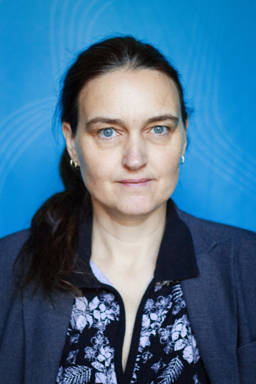Myanmar
New Book Chapter: “We Are Alive, but Have No Life”: Rohingya Refugees, Deprived of the Prospects for a Future
The new book chapter "We Are Alive, but Have No Life": Rohingya Refugees, Deprived of the Prospects for a Future written by Senior Researcher Marte Nilsen, explores some of the everyday strategies of survival that stateless, Rohingya refugees in Bangladesh make use of to navigate under the precarious conditions of being denied rights and recognition.
Klo Kwe Moo Kham Successfully Defends Master's Thesis
Klo Kwe Moo Kham has successfully defended his thesis "The Quest for Peace in Kawthoolei: The Strategies, Outcomes, and Sustainability of Peacebuilding in Southeast Myanmar, 2012-2020".
New Online Exhibition from the TRANSFORM Project
In societies at war or facing severe repression, what motivates individuals to take action for social justice when doing so involves great risk and uncertainty? How do such small but often heroic everyday acts of common people inspire larger transformations? And what is the impact of storytelling about everyday acts that challenge inequalities and injustices in places like Myanmar, Somaliland and Syria?The TRANSFORM research team has grappled with these questions for four years, and you will ...
Artistic Encounters in War and Violent Conflict: New Platform for the INSPIRE Project Launched
On June 3rd 2021, the INSPIRE research platform was launched with a live performance by Faytinga and a presentation of artwork by Diala Brisly.
POPAGANDA – Funding in Place for Project
How do political opposition groups in Myanmar and Thailand use popular culture and art to generate legitimacy for their political causes and propagate their messages?
Stateless in the Bengali borderlands — Funding in Place for New Project
The project will investigate the current crisis of statelessness affecting millions of people in the Bengali borderlands, including the Rohingya population of Myanmar and Bengali Muslims in the Northeast Indian state of Assam.
Myanmar Land Rights Activism in New Animation from PRIO
What drives the small but often heroic everyday acts of people in their attempts to challenge dehumanization and abuse in violent conflict? PRIO is proud to share the first of a series of three animations and comics from Myanmar, Syria and Somaliland, made for the TRANSFORM project in collaboration with PositiveNegatives.
Trude Stapnes Hired as a Doctoral Researcher on the INSPIRE Project
Funding Secured for Project on Artists in Times of War
PRIO's Centre on Culture and Conflict has received funding from the FRIPRO programme of the Research Council of Norway for the 4-year project Inspirational Creative Practice: the Work of Artists in Times of War (INSPIRE).
PRIO Researcher Gives Talk on Sexual Violence in Armed Conflict
On 2 August, Julie Marie Hansen gave a talk about sexual violence in armed conflict at KSAS, Humanity Institute in Myitkyina, Myanmar.
PRIO Researchers Contribute to New Book on Women, Peace and Security in Myanmar: Between Feminism and Ethnopolitics
The book describes women’s efforts as agents for change in Myanmar and examines the potential of the peace process as an opportunity for women’s empowerment.
New Report on Community-Led Education in Rohingya Refugee Camps
Since the August 2017 crisis forced them to flee their native Myanmar, Rohingya refugees have attempted to rebuild a semblance of normalcy in the squalid camps of Cox’s Bazar, Bangladesh.
New GPS Policy Brief on Women in the Myanmar Peace Process
This new GPS Policy Brief on women’s participation in the Myanmar peace process asks: How well are women represented in the Ethnic Armed Organizations (EAOs) involved in the peace process?What kind of work do the women do? Do the women participate in decision-making as members of the EAOs’ central executive committees? Read the policy brief in full here.
New Blog on Women's Use of Facebook in Myanmar
With so much attention on the destructive role of Facebook in Myanmar, Doctoral Researcher Julie M.
Glemte konflikter: PRIO Podcast i sommer
I juni ble årets konfliktdata fra Uppsala universitet lansert i Journal of Peace Research.
Conference on 'Women, Peace and Security in Myanmar' held in Bangkok on 5 March
The conference was organised by the PRIO project on 'Gender Equality, Peace and Security in Nepal and Myanmar' (WOMENsPEACE).
New Issue of PRIO Gender, Peace and Security Update Out Now
The December 2017 issue of the PRIO Gender, Peace and Security Update is now out.
New Project to Study Social Media, Armed Conflict and Gender in Myanmar
From early 2018, Julie Marie Hansen will start a three-year doctoral research project studying the gendered impacts of social media on armed conflict and peacebuilding in Myanmar.
Call for papers: Women, peace and security in Myanmar
WOMENsPEACE
New issue of the PRIO Gender, Peace and Security Update
Empowering Survivors of Sexual Violence in DR Congo
De facto economic integration of Rohingya refugees in Bangladesh
PRIO Policy Brief
Rituals, Lore and Legitimacy in Post-Coup Myanmar
Journal article in Annali di Ca’ Foscari. Serie orientale
The Silent Winner of Myanmar’s Northern Conflict
Popular article in The Diplomat
Stalemate: Autonomy and Insurgency on the China-Myanmar Border
Book review in Contemporary Southeast Asia
Educación y Movilización Social en la Transición Española. ¿Propuestas para Otros Contextos?
Book chapter in MOVILIZACIÓN SOCIAL Y DEMOCRACIA EL DESAFÍO AUTONÓMICO ANDALUZ EN LA TRANSICIÓN ESPAÑOLA
Community-Led Education among Rohingya Refugees and the Politics of Refugee Education in Bangladesh
Journal article in Journal of Refugee Studies
Counting Myanmar’s Dead: Reported Civilian Casualties since the 2021 Military Coup
PRIO Paper
Conflict Trends: A Global Overview, 1946–2022
PRIO Paper
Myanmar’s Interrupted Transition: The Democratic Instinct Survives
PRIO Policy Brief
Narrating democracy in Myanmar: The struggle between activists, democratic leaders and aid workers by Tamas Wells
Book review in Asian Journal of Social Science
Prefiguring a democratic state: student activism and the National Education Law in Myanmar
Journal article in Compare: A Journal of Comparative and International Education
Monks and Militias in Myanmar
Popular article in East Asia Forum
Hvem kan redde Myanmar?
Popular article in Klassekampen
Rohingya-krisen fem år etter massakren
Popular article in Bistandsaktuelt
Rohingya, fem år etter
Popular article in Klassekampen
Rohingya refugees still desperate, five years after a genocide
Popular article in Southeast Asia Globe
'Something Is Better than Nothing': Online Learning Pursuits of Rohingya Youth and Teachers in Cox's Bazar, Bangladesh
Internal report
The Quest for Peace in Kawthoolei: The Strategies, Outcomes, and Sustainability of Peacebuilding in Southeast Myanmar, 2012-2020
Master thesis
Foreword to MIPS Annual Review 2020-21
MIPS Annual Peace and Security Review
Pretending to be States: The Use of Facebook by Armed Groups in Myanmar
Conference paper
Education Under Siege: Protecting Learning in Palestine, Myanmar and Beyond
Myanmar Roundtable: Artistic Practices after the Coup
INSPIRE Conference
Myanmar at a Tipping Point? International Strategies and Responses
Justifying Military Power in Myanmar and Thailand
Education for Rohingya Refugees in Bangladesh: Community Initiatives, Humanitarian Aid and the Impact of COVID-19
Inspiring Myanmar: Chuu Wai - An Artist with Baggage - INSPIRE Seminar Series
Small States and Great Powers Balancing, Affecting Change, and Navigating Dangers - Small State Perspectives in the Arctic and Asia
Conflict Trends Update: 1946-2020
Improving Education for Rohingya Refugees in Bangladesh
Aesthetic Nationalism: The Dance of War and Exile along the Thai-Myanmar Border
WOMENsPEACE Conference on Women, Peace and Security in Myanmar
The Politics of Genocide and the Impact on Humanitarian Aid and Peace in Myanmar
NWM-Norway Workshop
Civil Society Actors in Peace Processes – Experiences from Myanmar
Workshop on ‘Women and Peace Processes’ for Myanmar Women Delegation
Women’s Empowerment, Multitude and Democracy
Does Buddhism Support Democracy? The Role of Buddhism in the 2015 Myanmar Elections
Insurgencies, Counterinsurgencies and the Question of 'Buddhist Violence'
Clash of Universalisms?
Use of Ancient Belief System for Legitimacy and Struggle for Democracy during the Authoritarian Regime in Myanmar (1990-2010)
Pop Culture, Art, and Indigenous Ideas of Legitimacy in Struggles over Democratization and Peace (POPAGANDA)
Stateless in the Bengali borderlands : New technologies and challenges for identity and identification
Building peace along the Belt and Road? Chinese security assistance to Myanmar and The Philippines
The Quest for Peace in Kawthoolei: The Strategies, Outcomes, and Sustainability of Peacebuilding in Southeast Myanmar, 2012-2020
Inspirational Creative Practice: The Work of Artists after War and Violent Conflict (INSPIRE)
Inspirational Creative Practice: Art and Activism in Myanmar
EducAid: Improving Education for Rohingya Refugees from Myanmar Living in Bangladesh
Social Media in Armed Conflict through a Gender Lens: The Case of Myanmar
"The protest was our last and only weapon": A qualitative study of how individuals in Myanmar understand their motives for participating in protest
Social Media in Armed Conflict: The Case of Myanmar
Societal Transformation in Conflict Contexts (TRANSFORM)
WOMENsPEACE: Gender Equality, Peace and Security in Nepal and Myanmar
Democracy and Peacebuilding in Myanmar
Has Buddhism Something to Do with It? Buddhism, Politics and Conflict in Asia
Women Building Peace in Displacement: The transnational peacebuilding potential of Myanmar women in Norway
Conflict of Interest? 'Business For Peace' as Development Aid in Volatile Environments
Elections and Violence: The Role of the Upcoming 2015 Elections in Myanmar’s Peace Process
Myanmar's Political Opening: Its Impact on Ethnic Conflicts
The East Asian Peace (EAP) Program
Are We Nearing an End to Buddhist Extremism in Myanmar?
Myanmar's Ethnic Minorities Marginalized More
Myanmar: What now for Women and Minorities?
Are Myanmar's Monks Hindering Democratization?
The Rise of Political Buddhism in Myanmar
Endangered Co-Existence: Buddhist-Muslim Friction in Asia
ASEAN’s Rohingya Challenge: Can ASEAN fail to act and yet be a Community?
The Buddhist Face of Peace: Buddhist Peace Initiatives in Times of Religious Intolerance
Buddhist Nationalism Threatens Myanmar’s Democratic Transition
Norway's Tightrope Walk in Myanmar
A Dangerous Census
Myanmar's National Census - Helping or Disrupting Peace?
It’s Time To Rethink Myanmar's Ethnic Armed Organizations
Monks and Militias in Myanmar
Rohingya Refugees Still Desperate, Five Years after a Genocide
The Myanmar Military’s Roadmap to Survival
Telenor’s Exit from Myanmar: An External Review Is Needed
The New Pattern of Conflict in Myanmar
Myanmar’s Pandemic: The UN Must Act!
From Peaceful Protest to Civil Conflict in Myanmar
Education Under Siege: Protecting Learning in Palestine, Myanmar and Beyond
Myanmar Roundtable: Artistic Practices after the Coup
Justifying Military Power in Myanmar and Thailand
Inspiring Myanmar: Chuu Wai - An Artist with Baggage - INSPIRE Seminar Series
Conflict Trends Update: 1946-2020
Improving Education for Rohingya Refugees in Bangladesh
- Algeria
- Angola
- Botswana
- Burkina Faso
- Burundi
- Cameroon
- Cape Verde
- Central Africa
- Chad
- Cote d'Ivoire
- Democratic Republic of the Congo
- Djibouti
- East Africa
- Egypt
- Eritrea
- Ethiopia
- Gambia
- Ghana
- Guinea
- Guinea-Bissau
- Horn of Africa
- Kenya
- Lesotho
- Liberia
- Libya
- Madagascar
- Malawi
- Mali
- Mauritania
- Morocco
- Mozambique
- Namibia
- Niger
- Nigeria
- North Africa
- Rwanda
- Sahel
- Senegal
- Sierra Leone
- Somalia
- South Africa
- South Sudan
- Southern Africa
- Sudan
- Swaziland
- Tanzania
- Tunisia
- Uganda
- West Africa
- Western Africa
- Zambia
- Zimbabwe
- Abkhazia
- Afghanistan
- Armenia
- Azerbaijan
- Bangladesh
- Cambodia
- Central Asia
- China
- East Asia
- East Timor
- Georgia
- Hong Kong
- India
- Indonesia
- Iran
- Iraq
- Israel
- Japan
- Jordan
- Kazakhstan
- Kuwait
- Kyrgyzstan
- Laos
- Lebanon
- Malaysia
- Middle East
- Mongolia
- Myanmar
- Nepal
- North Korea
- Pacific Asia
- Pakistan
- Palestine
- Philippines
- Qatar
- Russia
- Saudi Arabia
- South Asia
- South Korea
- Southeast Asia
- Sri Lanka
- Syria
- Tajikistan
- Thailand
- Turkey
- Turkmenistan
- United Arab Emirates
- Uzbekistan
- Vietnam
- West Asia
- Yemen
- Albania
- Baltic Countries
- Belarus
- Belgium
- Bosnia and Herzegovina
- Caucasus
- Central Europe
- Croatia
- Cyprus
- Czech Republic
- Denmark
- Eastern Europe
- Eastern Mediterranean
- Estonia
- Finland
- France
- Germany
- Greece
- Hungary
- Ireland
- Italy
- Kosovo
- Latvia
- Lithuania
- Macedonia
- Moldova
- Montenegro
- Nordic countries
- Northern Europe
- Northern Ireland
- Norway
- Poland
- Portugal
- Romania
- Russia
- Serbia
- Slovakia
- Slovenia
- Southern Europe
- Spain
- Svalbard and the Jan Mayen Island
- Sweden
- Switzerland
- The Balkans
- The Baltic Sea Area
- The Barents Region
- The European Union
- The Netherlands
- Ukraine
- United Kingdom
- Western Europe
- Yugoslavia (former)








